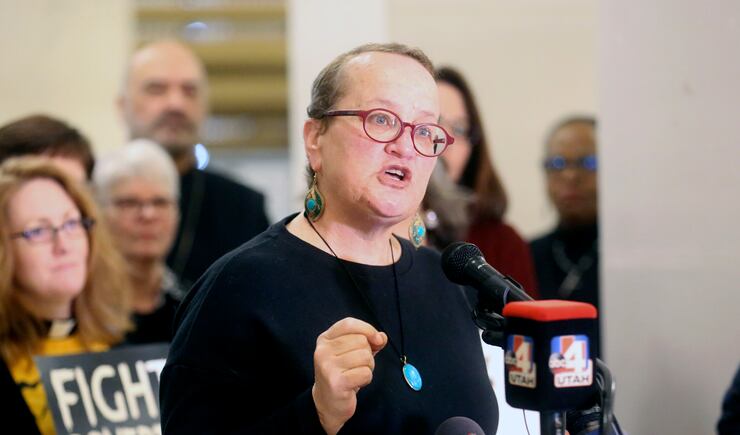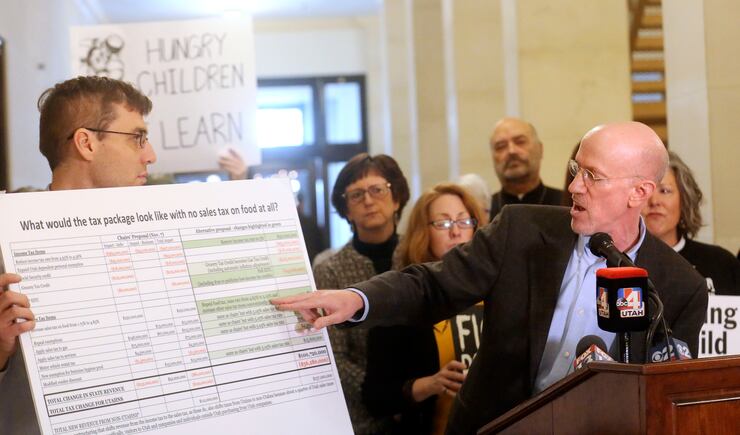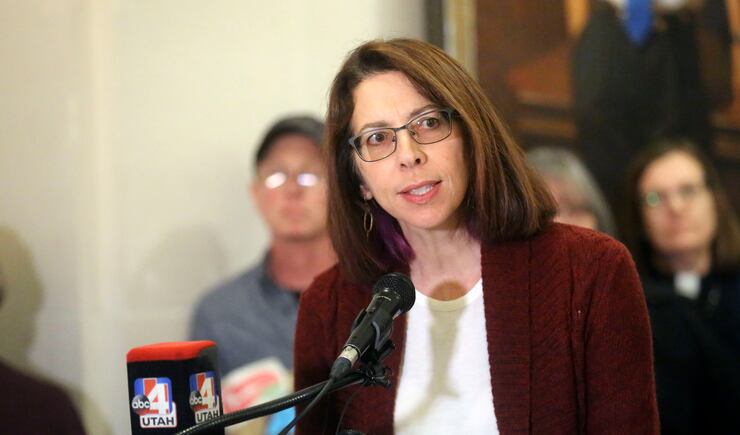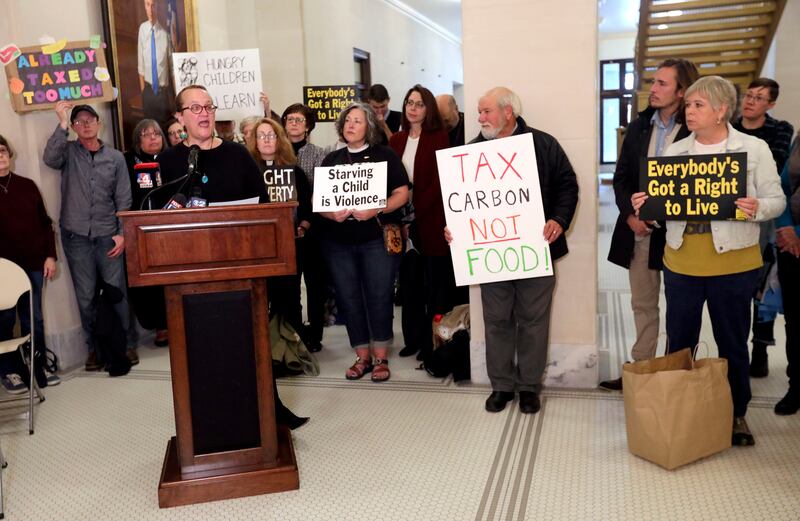SALT LAKE CITY — The Utah Legislature’s sweeping tax reform efforts could be wrapped up shortly, state House Speaker Brad Wilson, R-Kaysville, said Wednesday, telling House Republicans that “we’re close” to being able to hold a special session within a few weeks.
“It’s about time. We’ve worked on this hard for a year,” Wilson said during the House GOP caucus on the Legislature’s November interim day of meetings. He said new revenue numbers show sales tax revenues are lagging even further behind income taxes, accelerating the need for action.
“The importance of doing something is real,” the speaker told the caucus.
His statement came even as activists continue to raise concern about the plan to raise the sales tax on food as part of the restructuring.
The latest version of a proposal from the Tax Restructuring and Equalization Task Force, which includes changes to what services should taxed, will be made public on Friday. The task force already has moved what was its last scheduled meeting from Thursday to Monday.
Top lawmakers are still holding out hope for a special session in early December, so a reduction in the state income tax rate that’s in the tax reform bill draft could be in place at the start of the new year. Overall, the bill is anticipated to reduce state tax collections by about $80 million.
Wilson said the latest tax reform bill draft will no longer include adding sales taxes to veterinarian care, but will impose them on boarding and day care for pets. Also off the list of services to be taxed are coin-operated car washes, he said.
“Services seem to be the crux of concern,” the task force’s co-chairman, House Majority Leader Francis Gibson, R-Mapleton, said later in the day, adding that the list of services no longer on the list to be taxed also includes massages, tattoos, piercings, fortune telling and property maintenance.
Services that would still be subject to sales taxes under the proposal include Uber and other ride-hailing services, streaming videos, towing, storage facilities, home security fees, online dating, and shipping and handling on sales that are already taxed, Gibson said.
Dog grooming had been discussed as staying on the list, but it is already subject to sales taxes, according to the Utah State Tax Commission. There had been similar confusion surrounding portrait photography and photofinishing laboratories, which were on the list, then taken off even though they are already taxed.
Restoring the full 4.85% state sales tax on food, now taxed at 1.75%, remains in the bill draft, along with a grocery credit of up to $125 a person that would be available to low- and middle-income Utahns by filling out what Wilson said would be a “very simple” form.
Lifting the sales tax exemption on wholesale gasoline purchases is also still in the bill, expected to add some 12 cents a gallon to the price at the pump on top of the state’s gas tax, now about 31 cents a gallon. It’s intended to be in place only until there’s a new source of road funds, but the bill does not include a date for collections to end.
House Republicans were called into smaller meetings Wednesday to hear more about the need to back tax reform, while House Democrats spent an hour at their midday caucus discussing their concerns with the proposal, particularly restoring the sales tax on food.
“The proof’s in the pudding and we don’t even know what the flavor is yet. I think it changes every day,” said Salt Lake City Rep. Joel Briscoe, one of the two Democrats serving on the tax reform task force. “I’d be surprised if there was a Democrat who voted for the sales tax on food. I think that’s poison. I think the sales tax on food is poison.”
Several dozen people turned out for a rally against restoring the full sales tax on food.
“We’re here today to help our Legislature hear our voices,” The Rev. Vinnetta Golphin Wilkerson, of the Granger Community Christian Church, said. She said the church’s food pantry served 176 working families during a recent morning. “These families are struggling month to month, check to check, and will be unfairly impacted.”
She said lawmakers need to understand “the daily reality” for low- and fixed-income Utahns and that a “once-a-year rebate will not repair the harm done to families by this tax increase that will impact their budgets every single week.”



Jean Hill, director of the Office of Life, Justice and Peace at the Catholic Diocese of Salt Lake City, said those who would be hit hardest by the food tax increase don’t have “powerful lobbyists. ... This is our opportunity to say this is the wrong policy for our state. and we hope that legislators will see that sooner rather than later.”
Lawmakers should “find other means to broaden the sales tax base without doing so on the backs of those that have the least,” Hill said.
“Any legislative act that takes food off the tables of poor families or forces them to choose between basics such as food, shelter and health care is counter to our pro-life values,” she said, “Utah legislators have the means to develop tax policies that improve our state’s economic outlook without harming the most vulnerable.”
Republicans, who hold supermajorities in both the House and Senate, spent time talking about tax reform Wednesday in private meetings with legislative leaders. On the House side, that meant meeting in smaller groups where GOP members could more easily ask questions than in a caucus.
“Are there pinch points for some people? Yeah. When you deal with taxes, I’m not making everybody happy,” Gibson said. But he said Republican lawmakers have appreciated being kept up to speed and he believes there’s support for the proposal.
Senate Majority Leader Evan Vickers, R-Cedar City, said tax reform was “pretty much” all Republicans senators talked about in their closed-door caucus meeting and there are “sufficient votes to pass the bill” at this point. He qualified that statement by noting GOP senators don’t yet have “a bill to vote on. We have a concept.”
Vickers said the Senate Republicans want to see the provisions ending the sales tax collections on gas “strengthened,” but setting a specific date in the bill is only one option. Others described by Wilson include mandatory automatic reviews of the tax, plus additional scrutiny based on the price of gas.
“We’re getting a lot closer. We really are,” Vickers said, especially as the list of services to be tax continues to shrink. “A lot of the things that have created trouble and angst fall into the service categories.....We feel more comfortable.”
Earlier in the day, Wilson told reporters he was “thankful tax reform is hopefully getting resolved in the next few weeks” and that he feels “really good that we’re getting close to a place where we’re going to be able to fix our structural imbalance.”
Because the Utah Constitution mandates that income taxes can only be spent on education, GOP legislative leaders see amending the constitution to remove the earmark as key to tax reform and have been negotiating quietly with education leaders to identify a new source of money for schools.
Wilson said Wednesday that solution may not be ready for Monday’s meeting and did not offer any specific proposals other than suggesting the state could create an ongoing public education “rainy day” fund that schools could tap into when the economy dips.
“Assuming we’re able to negotiate and kind of get to a good spot, we’ll have a lot more details sometime within the next week or two,” the speaker said. The goal is to come up with a “more consistent” funding structure for schools that also includes more money coming from local districts.
Separate bills are expected to be drafted to begin the constitutional amendment process, which requires voter approval, and spelling out new funding for schools. Wilson said he would like to see both of those bills go to a special session along with tax reform, but added, “we’re going to do what’s right.”
He said passing a tax reform plan could resolve the imbalance in the budget for a decade.
A report to the Legislature’s Executive Appropriations Committee Tuesday showed state sales tax collections that make up the bulk of the state’s general fund, fell $21.7 million short of projections for the budget year that ended June 30, while income taxes were up more than $107 million, leaving nearly an $86 million surplus.
The task force was created during the 2019 Legislature after legislative leaders pulled a House bill extending sales taxes to most services that was opposed by the business community. The intent was to come up with a new proposal to be dealt with before the start of the 2020 Legislature in January.





